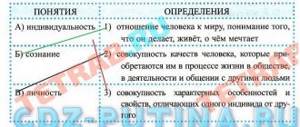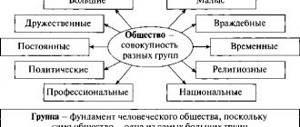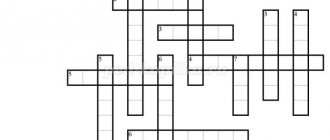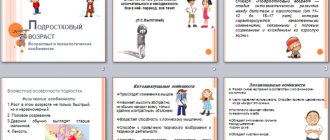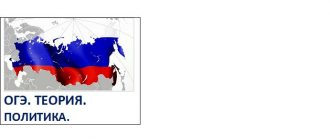Workshop on social studies on the topic “Politics”.
Workshop on the topic “POLITICS”
I. _ Basic level (individual independent work with self-test using keys) task No. 22 (estimated - 2 points)
1.
Compare elections and referendums. Select and write down in the first column of the table the ordinal numbers of similarities, and in the second column - the ordinal numbers of differences: 1) secret ballot of citizens;
2) citizens express approval or disapproval of any decision or law;
3) voting for candidates for public office;
4) only adult citizens have the right to vote.
| Feature of similarity | Features of difference |
2.
Establish a correspondence between the functions and the government institutions or officials in the Russian Federation that perform them: for each position given in the first column, select the corresponding position from the second column.
| FUNCTIONS | STATE INSTITUTIONS AND OFFICIALS |
| A) calls elections for the President of the Russian Federation B) issues decrees and orders C) resolves the issue of trust in the Government D) heads the state D) represents the state in international relations | 1) President of the Russian Federation 2) Federation Council 3) State Duma of the Russian Federation |
3.
Establish a correspondence between a fact of political life and a type of democracy: for each element given in the first column, select an element from the second column.
| DATA | TYPES OF DEMOCRACY |
| A) referendum on the adoption of the draft Constitution B) participation in elections to the State Duma B) election of the head of a political party D) delegation of a representative from the initiative group to a meeting of the municipal assembly | 1) direct democracy 2) representative democracy |
4 .
Establish a correspondence between the characteristics and types of political regimes: for each element given in the first column, select the corresponding element from the second column.
| SIGNS | TYPES OF POLITICAL REGIMS |
| A) free elections to government bodies B) rule of law B) mandatory state ideology D) comprehensive constant control of human life and society D) multi-party system | 1) democratic 2) totalitarian |
Write down the selected numbers under the corresponding letters in the answer line.
| A | B | IN | G | D |
5.
Match the forms of democracy with the examples: for each element given in the first column, select an element from the second column.
| EXAMPLES | FORMS OF DEMOCRACY |
| A) popular election of the president B) referendum B) selection of parliament members | 1) straight 2) representative |
Write down the selected numbers under the corresponding letters in the answer line.
| A | B | IN |
6.
Establish a correspondence between government bodies in the Russian Federation and their powers. For each element given in the first column, match an element from the second column.
| POWERS OF AUTHORITIES STATE AUTHORITY | ORGANS STATE AUTHORITIES |
| A) hears annual reports from the Government of the Russian Federation on the results of its activities B) manages the foreign policy of the Russian Federation C) approves changes in borders between constituent entities of the Russian Federation D) manages federal property D) resolves issues of citizenship of the Russian Federation and granting political asylum E) conducts financial, credit and monetary policies G) adopts Federal laws | 1) President 2) Government 3) State Duma 4) Federation Council |
Write down the numbers in your answer, arranging them in the order corresponding to the letters:
| A | B | IN | G | D | E | AND |
7. During the lesson, the teacher talked about various political organizations. Compare two types of political organizations: political parties and socio-political movements.
Select and write down the ordinal numbers of similarities in the first column of the table, and the ordinal numbers of differences in the second column.
1) Express the interests of certain social groups.
2) They strive to gain power and participate in its implementation.
3) They do not have a fixed membership.
4) They come up with civil initiatives on issues of political life.
| Similarities | Features of difference |
8. Ilya studied the constitutional structure of Russia, federal and regional authorities. Compare the powers of these authorities. Select and write down the serial numbers of the similarity traits in the first column of the table, and the serial numbers of the differences in the second column.
1) Implementation of measures to combat disasters, natural disasters, epidemics and liquidation of their consequences.
2) Determination of the status and protection of the state border.
3) Issues of upbringing, education, science, culture and sports.
4) Approval of the structure of government bodies of republics, territories, regions.
| Similarities | Features of difference |
II / Advanced level (work in groups with self-test, teacher consultation possible)
1.
Task 25
. Read the text below, each position of which is marked with a letter.
(A) Since the early 2000s. Country Z is undergoing political reforms. (B) It is gratifying that during the reforms new political parties emerged and the media began to operate freely. (B) Opinion polls have shown that the majority of citizens support the government's policies. (estimated – 1 point)
Determine which provisions of the text:
1) reflect the facts;
2) express opinions
Tasks No. 16 for the analysis of two judgments (estimated - 1 point)
2. Are the following judgments about political power true?
A. Political power performs the functions of management and control in society.
B. Political power is addressed to all citizens of the state.
| 1) only A is correct | 3) both judgments are correct |
| 2) only B is correct | 4) both judgments are incorrect |
3.
Are the following statements about politics correct?
A. Politics is concerned with participation in the affairs of the state.
B. Politics is an activity concerned with relations between large social groups regarding power.
1) only A is correct
2) only B is correct
3) both judgments are correct
4) both judgments are incorrect
4.
Are the following judgments about citizen participation in political life correct?
A. Citizens participate in political life through elections and referendums.
B. Citizens participate in political life by sending their appeals to government authorities.
1) only A is correct
2) only B is correct
3) both judgments are correct
4) both judgments are incorrect
5.
Are the following judgments about local self-government in the Russian Federation correct?
A. Local self-government is carried out by citizens through a referendum, elections, and other forms of direct expression of will.
B. The structure of local government bodies in the Russian Federation is determined by the Government of the Russian Federation.
1) only A is correct
2) only B is correct
3) both judgments are correct
4) both judgments are incorrect
6.
Are the following statements about forms of government correct?
A. All modern democracies are republics.
B. The transfer of power of the head of state by inheritance is inherent in monarchies.
1) only A is correct
2) only B is correct
3) both judgments are correct
4) both judgments are incorrect
7. Read the text and complete tasks 26-31.
26-28, 30-31 – estimated 1-2 points, 29 – estimated 1-3 points,
Civil society
Civil society is a structured society. It contains within itself a mass of non-state associations that are independent of the state, and a person, being a member of one or more unions or associations, no longer stands alone in the face of the state machine. She can no longer calmly drive through it and not notice it.
Here I am not so much a citizen of the state as a member of the consumer union, a member of the firemen's assistance club, a parishioner of the temple, and a visitor to the sports club. I am a member of a team with which we have common interests, we protect each other, we help each other. The same “Consumer Union” is a very serious public organization that, at your request, can sue any enterprise that produces low-quality goods and services. This organization has its own magazine, its own lawyers and can, in principle, ruin any public or private enterprise if it is found to be disrespecting consumer rights.
The sprouts of civil society are still emerging in our society. But if we take, for example, modern Germany, then it is highly developed there. Small enterprises are being created that call themselves “collectives” and “social projects”. These are preschool education centers, food cooperatives, workshops, and public libraries. There is a broad civil rights movement.
All this taken together creates a picture of a rich civil society, where a person can always find a group of like-minded people, can always receive protection from the injustices of the state and from his own loneliness. A person feels like a person only in his small group, where everyone knows, loves him and helps each other.
Based on materials from the encyclopedia for schoolchildren
26
. Highlight the main semantic parts of the text. Give each of them a title (make a text plan).
27
. What two functions of civil society are mentioned in the text?
28
. What manifestations of civil society are mentioned in the text? List any five manifestations.
29
. Give three examples of civil society protecting the interests and rights of citizens. In each case, name the citizen's protected right, and then give an example.
30
. Some scientists believe that the full functioning of civil society is possible only in a state governed by the rule of law. Give two arguments to support this opinion.
31
. The text contains the statement: “A person feels like a person only in his small group.” Do you agree with this statement? Based on the text and social science knowledge, give two arguments (explanations) in defense of your position.
Answers to the workshop on the topic “POLITICS”
Key to tasks 26-31
26.
The following semantic fragments can be highlighted and titled:
1) the composition of civil society;
2) tasks of civil society organizations;
3) the degree of development of civil society in our country and in the West;
4) the importance of civil society groups for human life.
27.
The correct answer should indicate the following functions of civil society:
1) uniting citizens into groups of like-minded people;
2) protection of the rights of citizens from the state machine.
28.
The answer may indicate the following manifestations of civil society:
1) member of the consumer union;
2) member of the firemen's assistance club;
3) a parishioner of the temple;
4) visitor to a sports club;
5) a visitor to a public library.
29.
The correct answer may include the following rights and examples:
1. Consumer rights. Every citizen can receive help from the Consumers Union if he received low-quality goods in a store.
2. The right to a favorable environmental environment. Citizens uniting in public organizations protest against deforestation for the construction of a highway through the territory of the reserve.
Other rights may be specified and corresponding examples given.
30.
The following arguments can be given:
1) for the functioning of civil society, such a principle as the supremacy of laws is necessary;
2) for the functioning of civil society, the principle of priority of human rights and freedoms is necessary;
3) for the functioning of civil society, the principle of subordination of the state to laws is necessary.
Other arguments may also be given.
31.
The correct answer may include the following arguments in defense of this point of view:
1) in a small group it is easier to achieve love and respect;
2) interpersonal relationships arise only in a small group.
Arguments to refute:
1) public people: politicians continue to feel like people even when communicating with a huge number of people (the president with the entire nation);
2) the opportunities for self-realization in large groups are much higher.
Other arguments may also be given.
Keys part
I :
| 1 | 1423 | II. advanced level: keys | |
| 2 | 1.(25) | 122 | |
| 3 | 1212 | 2.(16) | 3 |
| 4 | 1122 | 3 | 3 |
| 5 | 112 | 4. | 3 |
| 6 | 3142123 | 5 | 1 |
| 7 | 1423 | 6 | 2 |
| 8 | 1323 | ||
| 9 | |||
